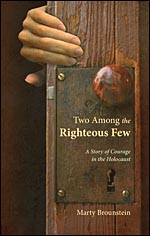MARTY BROUNSTEIN: TELLING A “RIGHTEOUS” HOLOCAUST STORY
Holocaust stories do not have happy endings. But there are exceptions. Author Marty Brounstein should know. He married one. His wife, Leah Baars, was born in hiding, saved by a Dutch couple, Frans and Mien Wijnakker. The Wijnakkers, Catholics, harbored her Jewish parents for 18 months, keeping them out of the Nazis’ clutches. “My wife is one of the Wijnakkers’ miracles,” Brounstein tells Pop Culture Classics. Brounstein, a San Mateo, California-based author, speaker and management consultant, who owns the Practical Solutions Group, has written books before, such as “Communicating Effectively For Dummies.” But his riveting new one, “Two Among The Righteous Few: A Story of Courage in the Holocaust,” takes him in a very different, far more emotional direction. The author knew only the bare bones of the story, no specifics, until he and Baars, a retired school psychologist, visited the Netherlands in 2009. There they reconnected with the Wijnakkers’ family. Baars had, to a large extent, lost touch with them after her parents emigrated to Los Angeles, when she was 13. Mien died in 1980, Frans in 1994. Brounstein and Baars saw photos of a plaque and a tree at Jerusalem’s Yad Vashem, honoring the Wijnakkers as Righteous Among the Nations, for opening their home to Jews and finding safe houses for others, from 1943 to 1945. One of the Wijnakker children gave them a little, self-published Dutch book that offered a rudimentary account. “We stumbled into this by accident,” says Brounstein, who was once a history teacher. “That began the journey of discovering the story in more detail.” When they returned to the U.S., Baars translated the book for Brounstein and his fascination grew. He began doing research and, in 2010, they went to Haifa, Israel, where they interviewed the first woman the Wijnakkers had rescued, a small child at the time. “The people who have earned this honor, Righteous Among Nations, come from all walks of life,” Brounstein says. “If there’s any commonality, there’s a certain moral fiber to all of these people. What you had going on in the world at that time was a climate of hate and indifference, The Wijnakkers were the opposite. They cared. Were they scared at times? Yes. Did they have doubts at times? Yes. Did they back away? No. They persisted. Even now, when I reflect on it, I’m stunned. There were so many challenges along the way that Frans was constantly encountering. And yet, they persisted.” The Wijnakkers arranged for Baars’ birth to take place in a nearby convent and, with the approval of her parents, registered her as their own child, to put the Nazis off the track. “Once it was learned that Leah’s mother was pregnant, they could have sent her away,” Brounstein says. “It was quite a challenge to pull this off. There were such dangers. If you were caught trying to hide Jews, you were going to be treated like a Jew. You got shipped off to the concentration camps. There was also the potential for execution. “I say I’m in the interfaith business, because this is a real story at the heart of what interfaith is about, which is respect. You can have your religious belief, I can have mine. But we respect one another. Religions don’t teach hate other religions. People teach that.”
“We’ve always had a close relationship and now it’s even closer. It’s a journey we’re making together. I would not be doing this without her support, her blessing and now, her involvement.” Brounstein also had the encouragement and support of the Wijnakker family. He recently heard from one of the Dutch couple’s grandchildren. “She said, ‘Thank you. You’ve giving us a legacy we can pass on to our next generation.’ She’s very proud of her grandparents and what they did.“ In a world where hate and indifference still plague us, her grandparents’ actions can inspire us all. “In our everyday life, when things get tough, some people give up,” Brounstein says. “These people had the lives of others in their hands. It would have been a lot easier to give up. Look at the real dangers they were putting themselves into. The threats were always around them. Their house was raided. “All of this was so difficult, yet Frans didn’t quit. He had a positive spirit. These were real heroes, who had the courage to continue, even though it was tough, because they had people depending on them. “That word, ‘hero’ gets misused a lot in our society. You hit the home run to win the game. You sang a great song. You gave a great performance in a movie. That’s celebrity stuff. That’s not heroes. Even pulling someone out of a burning building, that’s a heroic moment. This is stuff that these people did for nearly two years. They saved lives in that day and age, when most people would not get involved. Even those who felt sympathy for the plight of the Jews would not get involved. Frans and Mien did. They saved at least two dozen Jews from certain death.” This story of two heroes ends quite differently from those of Anne Frank or Corrie ten Boom, also part of the Holocaust in the Netherlands. “It’s a positive story in the midst of horrific tragedy. Here’s a Holocaust story where there’s a rescue. And everybody is saved. The Wijnakkers’ story needed to be told.” An Indigogo crowdfunding campaign has been launched to raise funds for developing the remarkable story into a film. You can participate! www.indiegogo.com/projects/two-among-the-righteous-few-feature-film-adaptation-development-funds-campaign |

